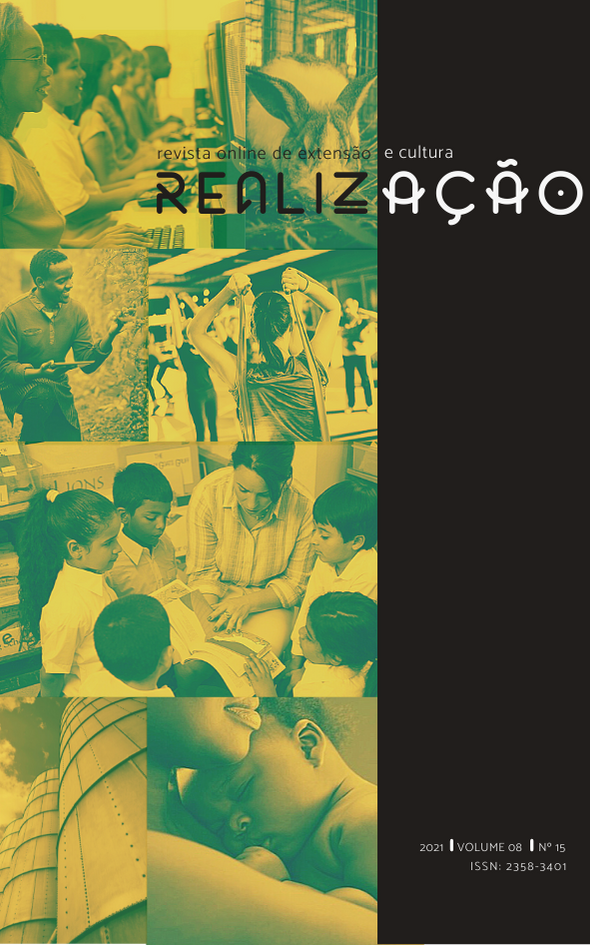Literature and citizenship
DOI:
https://doi.org/10.30612/realizacao.v8i15.12733Keywords:
Reading, Culture, Spanish, PortugueseAbstract
The “Literature and Citizenship” project proposes meetings to discuss literary works among adolescents and high school students, aiming to enhance their human and civic development. In this context, the inclusion of work with Hispanic culture also plays a prominent role, considering the wealth of reflections resulting from reflection on other cultures and foreign languages. Under guidance, the scholarship holders research, study and analyze previously selected works and then organize and mediate face-to-face meetings open to the community, with the aim of promoting interaction and exchange of knowledge between the public inside and outside the IFPR-Telêmaco Borba Campus. Reading activities, both in foreign and native languages, interpretation, immersion in different cultures and discussion culminate in human development, based on the inference of facts and the refinement of senses and sensibilities, which ultimately reflects in recognition and civic action. The goal is to provide this education through literature and contact with Hispanic culture, promoting workshops for reading and discussing literary texts, which encourage reading and discuss themes from the reality experienced by the participants, mediated by the scholarship holders. As a result, greater integration between the IFPR Campus and the local community is expected, given that this approximation of what is produced within the institution with the community is what gives the project its extensionist character. In addition, it is expected that the public covered by the project will develop their critical and civic side, collaborating in their actions and understanding of the world.
Downloads
References
BRASIL. MINISTÉRIO DA EDUCAÇÃO. SECRETARIA DE EDUCAÇÃO BÁSICA. Orientações Curriculares para o Ensino Médio – Linguagens, códigos e suas tecnologias. Brasília (DF), 2006 v. I.
GULLAR, Ferreira. Toda poesia (1950-1999). 12 ed. Rio de Janeiro: José Olympio, 2004.
IFPR. Plano de Desenvolvimento Institucional – PDI 2014/2018. Curitiba, dezembro/2014. Disponível em: http://reitoria.ifpr.edu.br/wp-content/uploads/2014/10/PDI-2014-2018- Vers%C3%A3o-Final-1.pdf. Acesso em 31 jan. 2017. Disponível em: http://telemaco.ifpr.edu.br/wp-content/uploads/2016/11/pdf-completo.pdf. Acesso em 31 jan. 2017.
ZAPPONE, Mirian Hisae Yaegashi; WIELEWIEKI, Vera Helena Gomes. “Afinal, o que é literatura”. In: ZOLIN, Lucia Osana & BONNICI, Thomas (orgs.). Teoria Literária: abordagens históricas e tendências contemporâneas. 3 ed. Maringá: EDUEM, 2009, p. 19-31.
Downloads
Published
How to Cite
Issue
Section
License
Copyright (c) 2021 Katrym Aline Bordinhão dos Santos, Kelly Cristinna Frigo Nakayama

This work is licensed under a Creative Commons Attribution-NonCommercial-ShareAlike 4.0 International License.
Autores que publicam nesta revista aceitam as normas de publicação, bem como, concordam com os seguintes termos:
(a) O Conselho Editorial se reserva ao direito de efetuar, nos originais, alterações da Língua portuguesa para se manter o padrão culto da língua, respeitando, porém, o estilo dos autores.
(b) Autores mantêm os direitos autorais e concedem à revista o direito de primeira publicação, com o trabalho simultaneamente licenciado sob a Creative Commons Atribuição-NãoComercial-CompartilhaIgual 4.0 Internacional que permite: Compartilhar — copiar e redistribuir o material em qualquer suporte ou formato e Adaptar — remixar, transformar, e criar a partir do material. A Creative Commons Atribuição-NãoComercial-CompartilhaIgual 4.0 Internacional considera os termos seguintes:
- Atribuição — Você deve dar o crédito apropriado, prover um link para a licença e indicar se mudanças foram feitas. Você deve fazê-lo em qualquer circunstância razoável, mas de nenhuma maneira que sugira que o licenciante apoia você ou o seu uso.
- NãoComercial — Você não pode usar o material para fins comerciais.
- CompartilhaIgual — Se você remixar, transformar, ou criar a partir do material, tem de distribuir as suas contribuições sob a mesma licença que o original.
- Sem restrições adicionais — Você não pode aplicar termos jurídicos ou medidas de caráter tecnológico que restrinjam legalmente outros de fazerem algo que a licença permita.


